Latitudes in partnership with Doyle Wham bring you
Into the Fold
Doyle Wham, a UK gallery promoting contemporary photography from Africa and its diaspora, and Latitudes Online is delighted to announce the opening of Into The Fold, a new exhibition of forty works spanning four decades of innovative practice by eight women photographers and creative practitioners.
From Angèle Etoundi Essamba’s hand-crafted intimate black and white silver gelatin prints, to more recent digital collages by Puleng Mongale, and elaborately constructed portraits created through lockdown by the collective Umseme Uyakhuluma with women from South Africa and the Ivory Coast, Into The Fold presents responses to identity, the body, self-knowledge, womanhood, colonialism, culture and the land. The exhibition is a curatorial collaboration by two women-led organisations: Doyle Wham, the UK's only contemporary African photography gallery, and Latitudes, a leading online platform for contemporary African art based in Johannesburg.
The earliest body of work is Angèle Etoundi Essamba's groundbreaking series of vintage silver gelatin prints, sharp contrast black and white images of non-professional female ‘models’, who range from family members to friends and acquaintances of the artist, and women she has met on the street. Developed by the artist in her personal darkroom between 1986 and 2002, the 18 prints on show are among the last remaining in Essamba’s possession. Depicting the beauty of lustrous bare skin, or accessorising her subjects with swaths of fabric, traditional headwear, jewellery or body paint, Essamba's portraits challenge stereotypical presentations of Black women to foreground the female narrative, reflecting on the cultural identity of the modern African woman. Essamba was born in Cameroon, grew up in Paris and now lives in Amsterdam. She has exhibited extensively internationally in museums, galleries, biennials and art fairs around the world, and her works are held in many major collections.
Like Essamba, Puleng Mongale confronts stereotypical depictions of Black womanhood, in surreal digital images constructed from multiple self-portraits collaged with familiar and distant worlds; African rural and urban landscapes, the sea or domestic interiors. Mongale’s work re-imagines her history, exploring her maternal heritage and ancestral relationships, as well as taking inspiration from the Black, working-class women she encounters in everyday life. Mongale’s creative practice is an act of personal and political reclamation, by inserting herself into scenarios that counter historically limited photographic portrayals of Black women. Deeply personal explorations of the artist’s relationship with spirituality emerge in Mongale’s Spirit series, begun during lockdown, and which pay tribute to the importance of acts of remembrance, both ancestral and godly. Born in Orlando East, Soweto, Mongale originally trained as a copywriter, turning to photography in 2019. Based in Johannesburg, she has exhibited in South Africa, Nigeria and Germany.
One of the first collaborative projects of its kind on the African continent, Umseme Uyakhuluma: A Celestial Conversation draws on the representation of the Black African woman and African storytelling across the continent and diaspora, anchored around myth, African spirituality and magic realism. The work is a collaborative experimental video, photography and sound work led by creative director Zana Masombuka (aka Ndebele Superhero), with Lafalaise Dion, Tsholofelo Maseko, Mapula Lehong, Boiphelo Khunou and Bontle Juku, five leading women creatives whose practices span photography, video, performance, design, editing and production, based in South Africa and the Ivory Coast. Presented for the first time as a series of large format colour ‘performance prints’, and a sound and image installation Umseme Uyakhuluma follows two women artists as they go on a journey of creation, reawakening and remembering in response to a calling that has been silenced for centuries. Directly translated ‘umseme uyakhuluma’ means ‘the straw mat speaks’, referencing one of Africa’s most ancient ways of recording information using grass, an endlessly renewable material. The work utilises other references significant in African culture, such as the spiritual properties of cowrie shells, and Bantu, one of Africa’s most sacred languages.
Doyle Wham was created as a response to the lack of collaborative international infrastructure and exhibition opportunities for emerging and established African women photographers and artists. Into The Fold is committed to collaborative shows that enable Africa-based organisations with a focus on photography to gain a physical footprint in London, and to offer the artists broader international reach.
8 October - 14 November 2021, 35 – 37 Villiers Street, London WC2N 6ND.
Opening hours 12 - 7pm Monday - Sunday. Free admission. For out of hours viewings, tours or private appointments, please email hello@doylewham.com
ARTISTS
ANGÈLE ETOUNDI ESSAMBA
Angèle Etoundi Essamba was born in Douala, Cameroon, educated in France and she graduated from the School of Photography of Amsterdam where she lives. Since her first exhibition in 1985 in Amsterdam, her work has continued to be exhibited in museums, institutions, art fairs, biennales and galleries in Africa, Europe, the United States, Latin America, Arab Emirates and Asia.
Essamba's work lies at the intersection of the social/gender and the artistic field. She uses photography to bring her message across in a creative way. Her varied background and various travels have not only profoundly shaped her eye, but also mean her outlook is equally aesthetic, idealistic, realistic, and societal. Therefore, she joins the spirit of humanistic photography with a strong attachment to the values of communion. Women constitute the main subject of her artistic expression. She is a committed artist involved in a reflection on the identity of the African woman. She records in an aesthetic way a vision on African women and African culture, giving a new interpretation of contemporary Africa. In her work, she challenges and breaks with stereotypical representations of women, by giving her subjects meaning and greatness. Keywords for Essamba’s work are pride, strength and awareness. She focuses exclusively on what the human radiates, whether alone, as a couple or as a group. Her approach is always based on a sense of proximity, reciprocity. In this universe that is hers alone, she controls color with the same artistry as black and white, she masters contrast with a sure touch and handles shadows and lights with dexterity and audacity.
Essamba’s photographs have been commented in various publications and books among which: Passion1989, Contrasts1995, Symboles1999, Noirs 2001, La Métamorphose du sublime 2003, Dialogues 2006, Voiles & Dévoilements 2008, Africa rising2010, As it is 2010, Africa see you, see me 2011, Black & Red 2012, Women of the water2013, Invisible 2015, Strength & Pride, 2016; Daughters of life 2018, Renaissance 2019.
Doyle Wham is delighted to represent Angèle Etoundi Essamba’s vintage prints collection: one-of-a-kind silver gelatin photographs hand-printed by the artist between 1986 and 2005.
Above artwork: Angèle Etoundi Essamba, Triple Dos, 2002, Edition no. 4 of 20, 40.7 x 50.5 cm, Gelatin silver print, £1650 framed, £1650 unframed
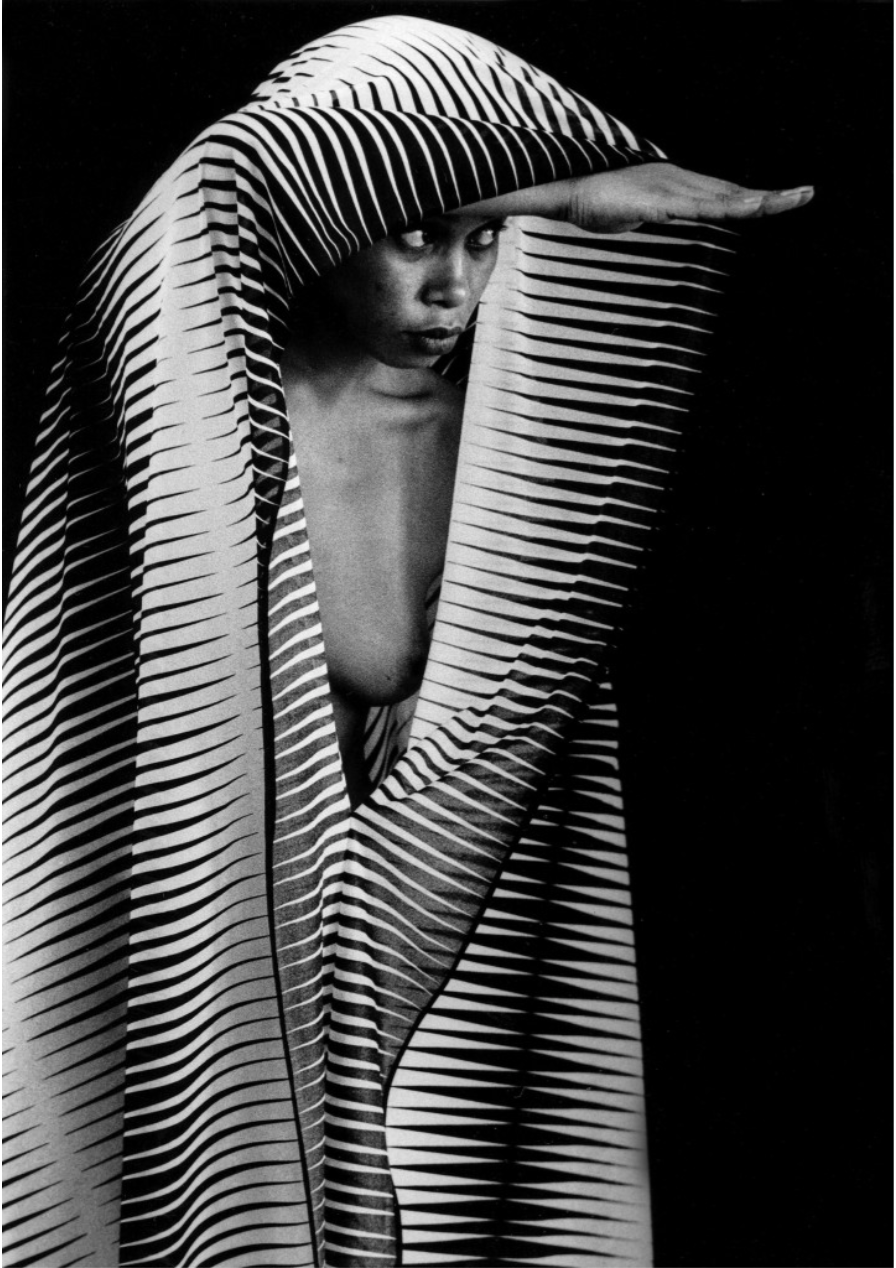
Angèle Etoundi Essamba, Cobra, 1986, Gelatin silver print, Edition no. 4 of 20, 40.7 x 50.5 cm, £1650 (framed), £1500 (unframed)
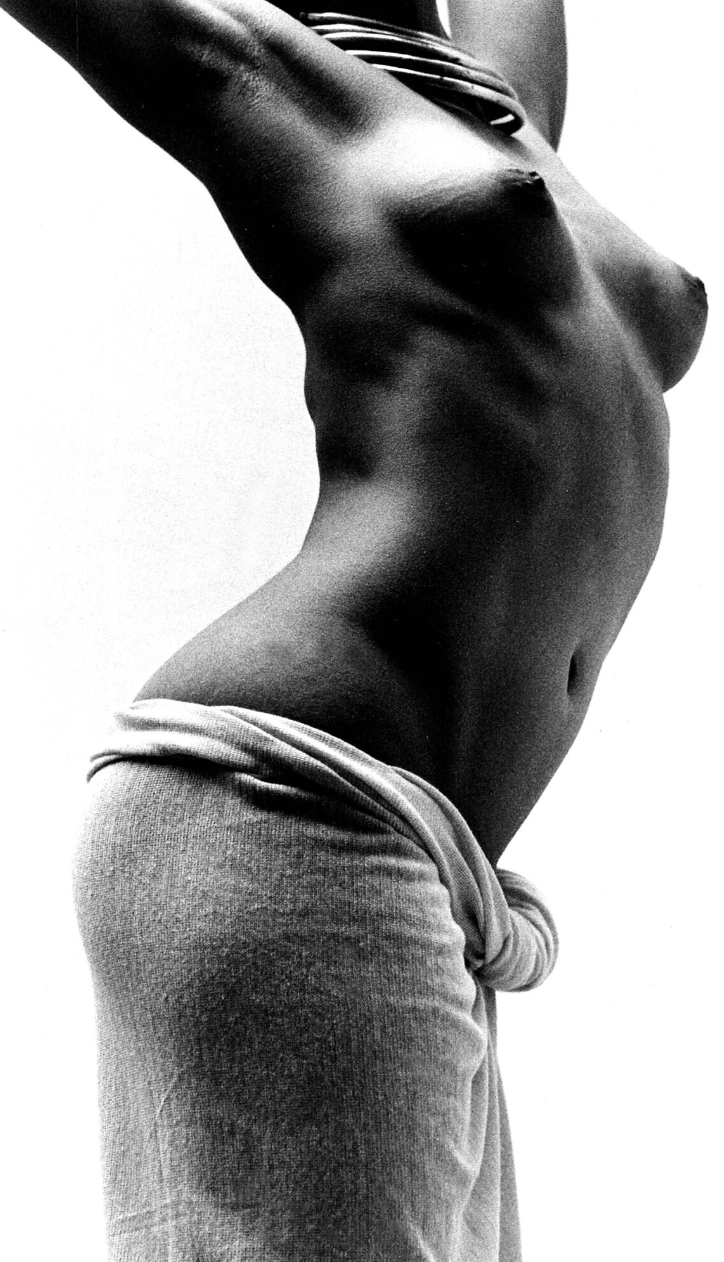
Angèle Etoundi Essamba, Profil Africain 1, 1986, Gelatin silver print, Edition no. 6 of 20, 40.7 x 50.5 cm, £1650 (framed), £1500 (unframed)
PULENG MONGALE
Puleng Mongale was born in 1991 in Orlando East, Soweto. She matriculated in 2009 and went on to attain a General BA, majoring in English and Communication Science, at the University of South Africa.
In 2015 she enrolled at Umuzi, a creative hub based in Jeppestown, and pursued copywriting, earning herself jobs in several reputable advertising agencies. Although constantly surrounded by photographers, she only picked up a camera in September 2019 after she had been retrenched. Currently, her favoured medium of expression is digital collages fused with self-portraiture.
Puleng Mongale's artistic expression is mostly influenced by the stories of the women in her life; women who raised her and women in her family who she has heard about but never met, such as her late great-grandmother, after whom she is named. She also draws inspiration from the black, working-class women she encounters daily in the city.
Mongale's digital collage work is a search for identity through an internal dialogue that revolves around a re-imagined history, the establishment and maintenance of ancestral relationships, black womanhood, and re/claiming her heritage. Mongale finds that her collage work, through self-portraiture, allows her to put together pieces of worlds she's never been a part of and worlds that she's trying to forge right now.
Above artwork: Puleng Mongale, City Girl Blues, 2019, Hahnemühle Photo Rag 310gsm mounted on 2.4mm Foamcore, Ed. of 10 | 30 x 30 cm, £350 (framed), £275 (unframed)
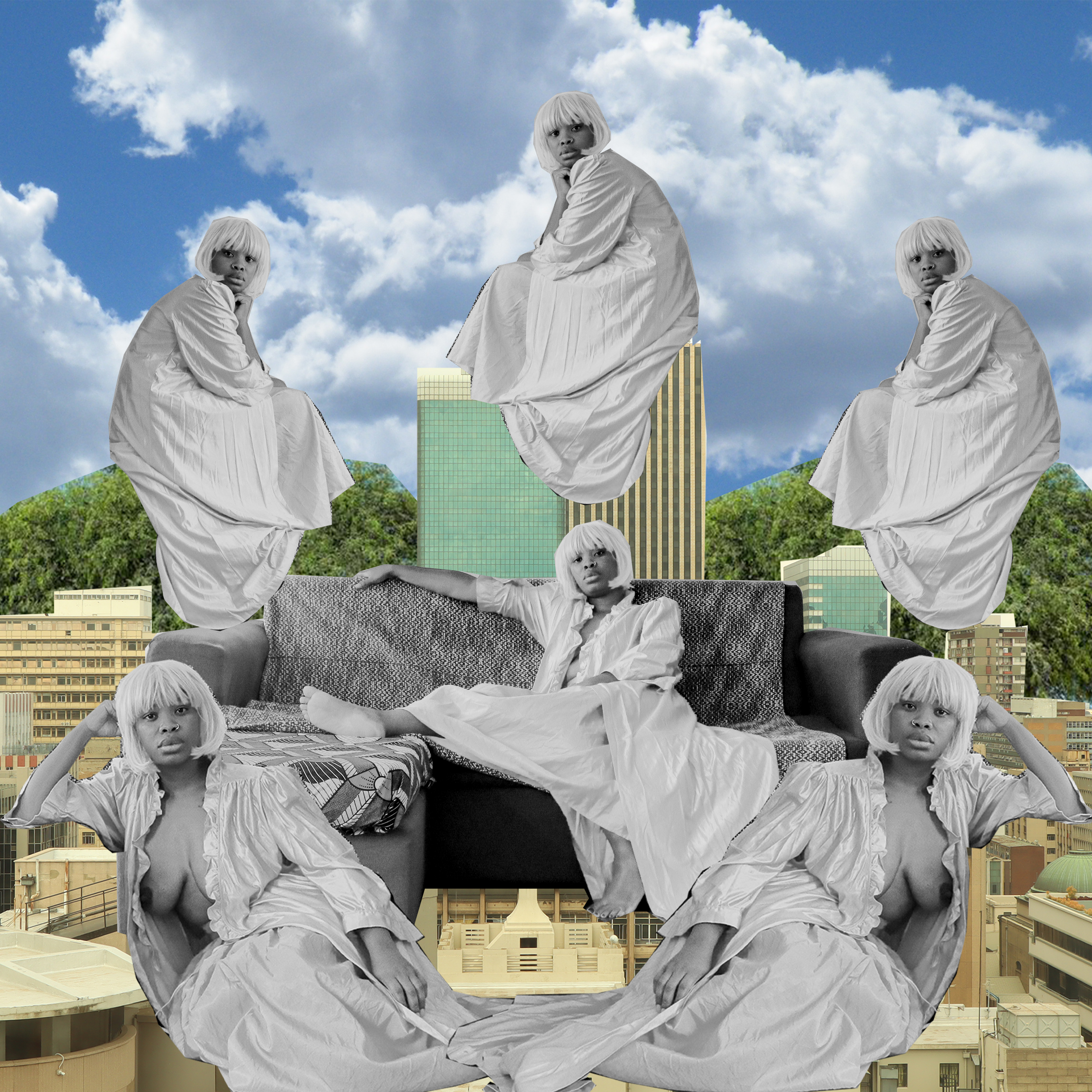
Puleng Mongale, Own World, Hahnemühle Photo Rag 310gsm mounted on, 2.4mm Foamcore, 2020, Ed. of 10 | 60 x 60 cm, £800 (framed), £650 (unframed)
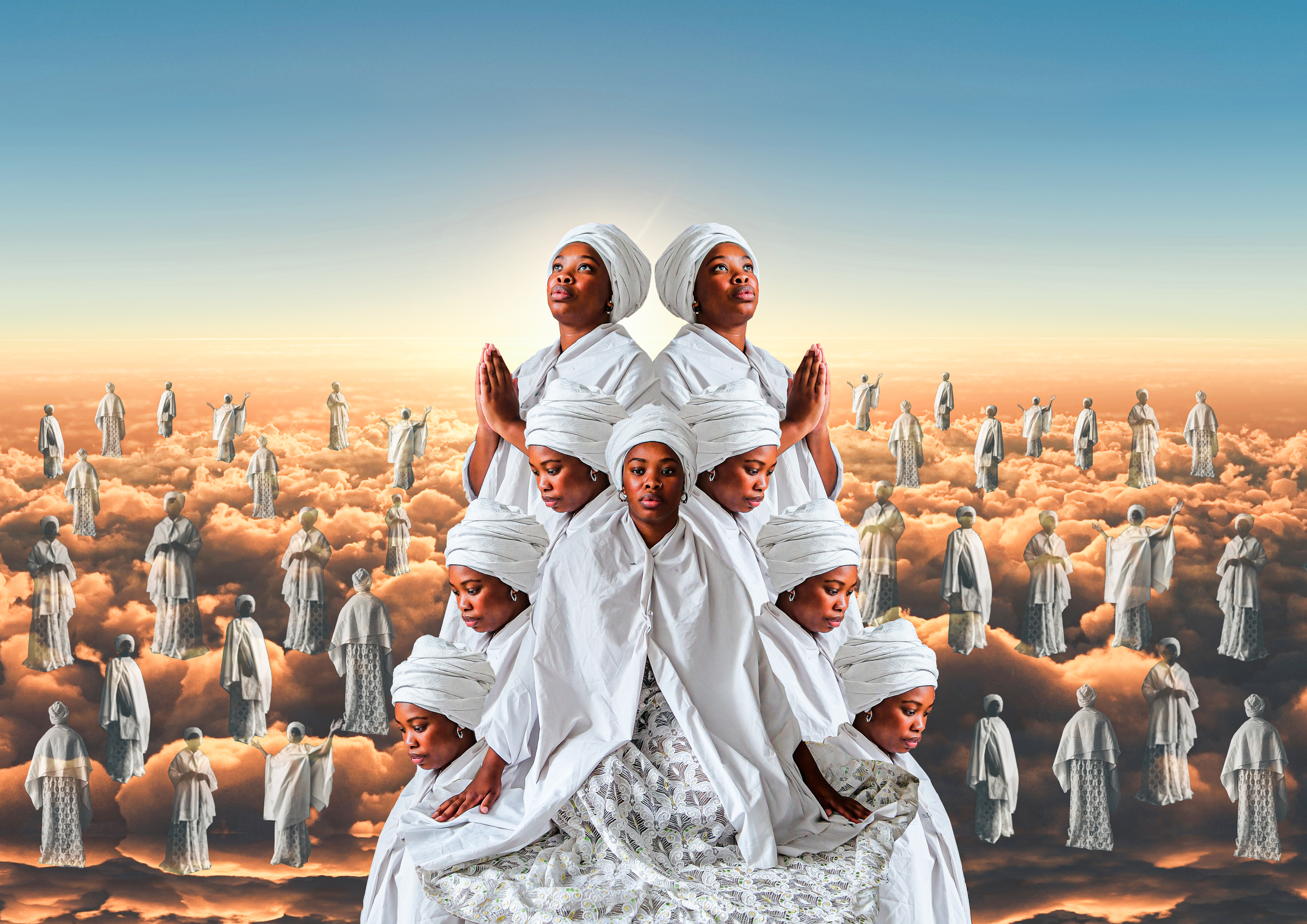
Puleng Mongale, Ascension, 2020, Hahnemühle Photo Rag310gsm mounted on, 2.4mm Foamcore, Ed. of 10 | 40 x 59.4 cm, £800 (framed), £650 (unframed)
UMSEME UYAKHULUMA: A CELESTIAL CONVERSATION
When the person ‘Myth’ meets the person ‘Reality’, the spirit of the impossible-strange appears in the dark disguise. It is always there where nothing inverts itself and becomes something; whatever is the imperative need.” (Sun Ra, circa 1964). The goal of the project is to shed light on the importance of African storytelling, in our own voices, centered around experimentation, mythism and magic realism. The stories explored in the project are shared in many African cultures as well as in African spirituality. It aims to encourage the significance of African mythology in the development of Africa. Furthermore, the project acts as a tool of expression and an invitation to its audience to explore the unknown; and help create new worlds that are at the intersection of Africa’s past and the vision of Africa’s Future. Lastly it acts as a thread that connects us intercontinentally with the knowing that the future of this continent lies in collaboration within the continent.
"Umseme Uyakhuluma: A celestial conversation" is a collaborative experimental body of work that aims to explore the power of the connectivity and duality that exists in different realms of existence and their subjective realities. The project goes deeper into the idea of communication and what that means for physical and non-physical spaces. “Umseme Uyakhuluma” directly translated is “The Straw mat Speaks”. It speaks to one of Africa’s most ancient ways of recording information using grass, which is an endlessly renewable source of material under historic land usage conditions. The project further looks at the reinterpretation of Bantu symbol writing, which is a form of ideography, that has evolved into a form of steganography. It was a form of coded language used in various parts of the continent to communicate sacred messages. This type of communication is preserved today in the Ndebele tribe, amongst others in Africa, called “Umgwalo”. The project parallels this with the historical significance of the use of cowry shells on the continent, honouring their divine importance in African Spiritualism and treating them as the messengers of the non-physical space explored in the project.
The project aims to use “Umseme Uyakhuluma” as a metaphor for communication and urges the viewer to go deeper into understanding what communication has been, what it is as we understand it today and what it will become. This is done through the spiritual use of the cowry shells and “umgwalo”; and how they manifest themselves in the different realms of existence both seen and unseen, to further explore previously ignored forms of communication. Lastly, the project acts as a modern-day letter between African Artists that is recorded using digital mediums, but further transcends this space and time, just like the cowry shells and “umgwalo.”
Umseme Uyakhuluma: A celestial conversation is a collaborative project whose core team is made up of an All African Women production including Zana Masombuka (producer, conceptual director, art director and actress), also known as Ndebele Superhero, whose quest is to amplify representation and African Storytelling through her artistic practice; Lafalaise Dion(producer, costume designer and actress) whose work with cowrie shells has been incorporated symbolically into the project (you would've previously seen her work in Beyonce's 'Black is King' and 'Spirit'); Tsholofelo Maseko (producer, art director and actress) a familiar face from integral South African television shows and films; Mapula Lehong (sound designer and editor), a SAFTA award-winning sound designer and multi-hyphenate whose poetry features in Zanele Muholi's SomnyamaNgonyama, Hail the Dark Lioness; Boipelo Khunou (videographer) a multidisciplinary artist and founder of archival platform BOTAKI KE BOTSHELO which merges education and curation of creativity from Africa; and Bontle Juku (photographer), a visual artist and conceptual photographer whose work explores narratives and sociopolitical discourse surrounding the Black body. She was one of Design Indaba's Emerging Creatives in 2020.The core team were supported by a larger cast and crew of women of all ages in South African and the Ivory Coast.
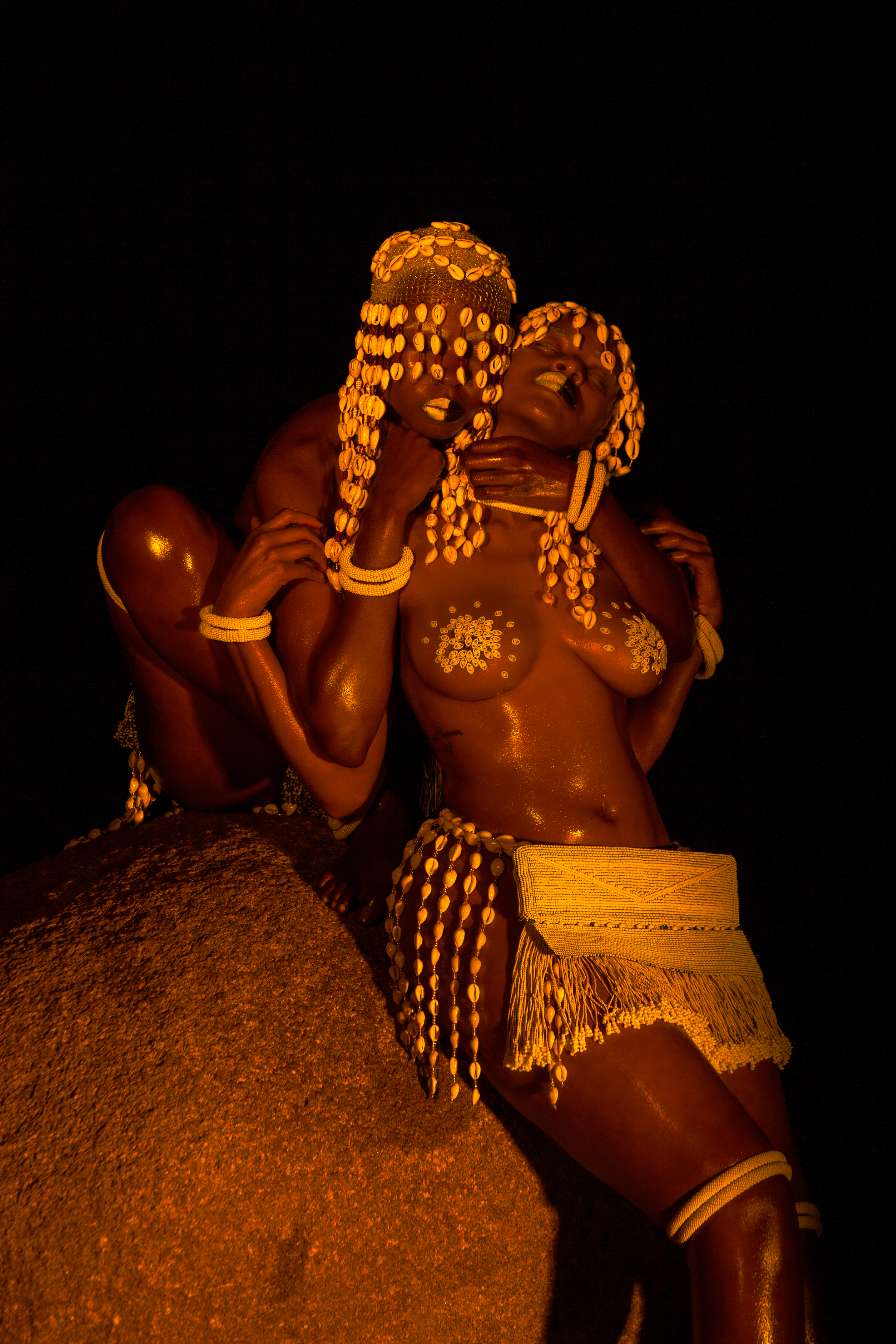
Umseme Uyakhuluma, UMSEME UYAKHULUMA V, 2021, digital print, printed Hahnemühle Fine Art Baryta Archival Paper, Edition of 8, £950 at A1 size (84.1 x 59.4cm) and £1450 at A0 size (118.9 x 84.1cm)
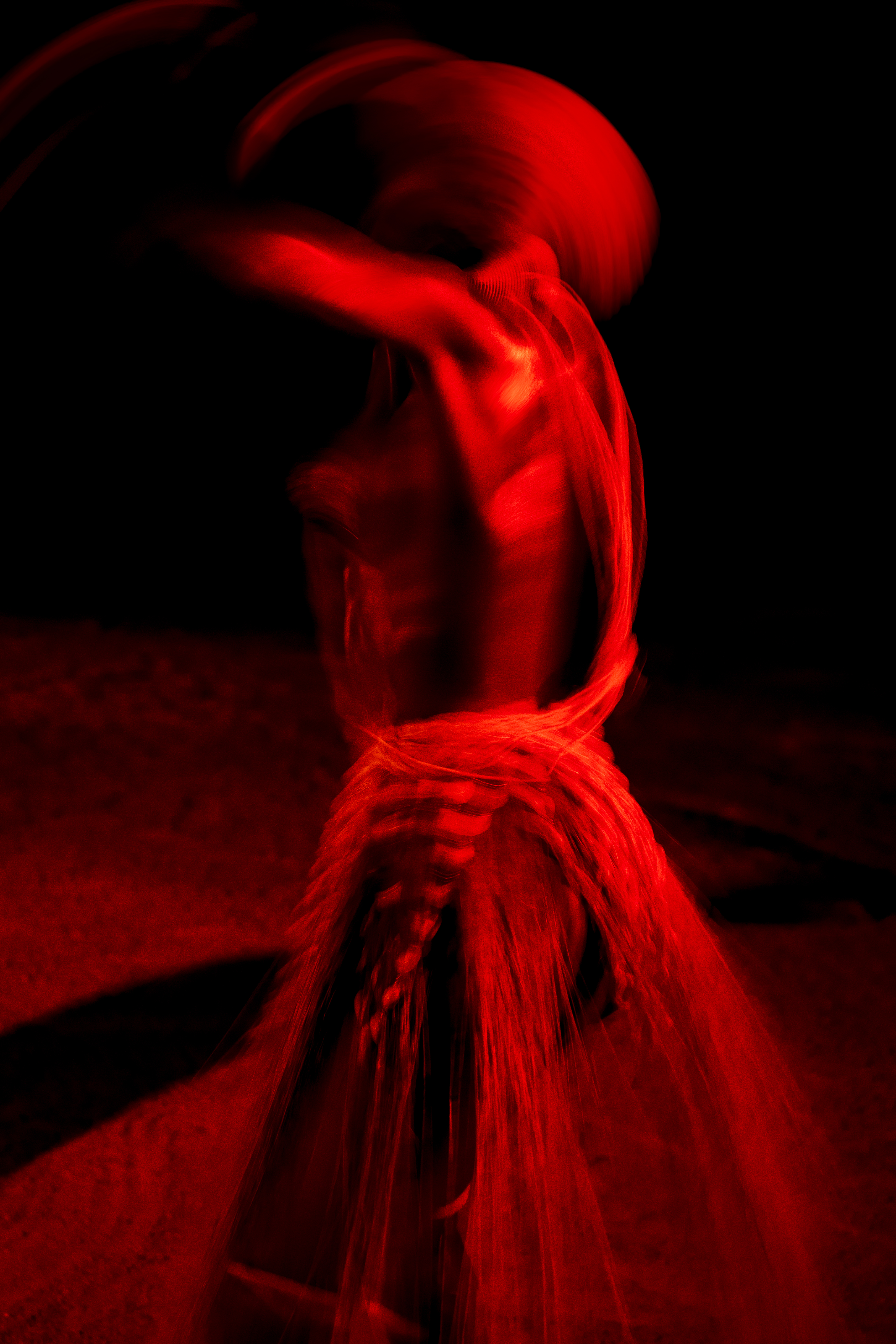
Umseme Uyakhuluma, UMSEME UYAKHULUMA XV, 2021, digital print, printed Hahnemühle Fine Art Baryta Archival Paper, Edition of 8, £950 at A1 size (84.1 x 59.4cm) and £1450 at A0 size (118.9 x 84.1cm)
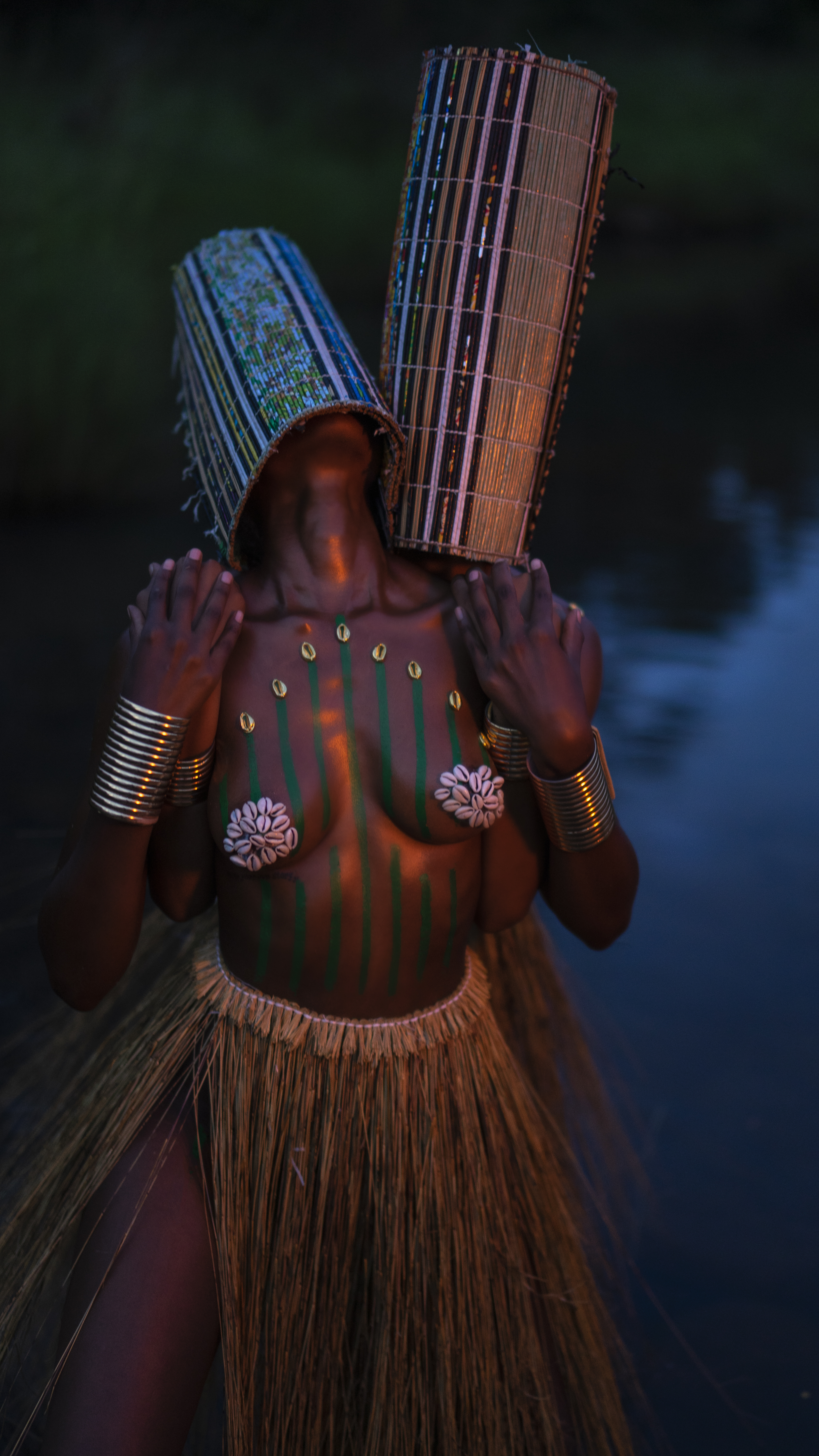
Umseme Uyakhuluma, UMSEME UYAKHULUMA XXIV, 2021, digital print, printed Hahnemühle Fine Art Baryta Archival Paper, Edition of 8, £950 at A1 size (84.1 x 59.4cm) and £1450 at A0 size (118.9 x 84.1cm)
About Doyle Wham
Doyle Wham is the UK’s first contemporary African photography gallery, founded in 2020 by London-based curators Imme Dattenberg-Doyle and Sofia Carreira-Wham. The gallery promotes innovative voices exploring the photographic medium across Africa and its diaspora. Responding to the lack of international initiatives and European platforms offering support and exhibition opportunities for African photographers, the gallery prioritises collaborations with Africa-based organisations.
Doyle Wham is also dedicated to ensuring accessibility both for artists and collectors. The gallery does not discriminate based on photographic equipment or art world experience, even working with smartphone photographers and exhibiting artists who have previously only shown their work via social media. With each exhibition, Doyle Wham makes a selection of limited editions available at lower price points to encourage new and younger collectors. 10% of the gallery’s profits are donated to its charity partners: MASK and Right for Education, organisations working to provide access to education and the arts in Africa.
About Latitudes Online
Latitudes is an online destination to explore and buy contemporary art from Africa. With a constantly changing, curated selection of art from the continent and the diaspora, the site brings together artworks presented by galleries, curators, studios, not-for-profit organisations and independent artists themselves.
The first platform of this kind dedicated to art from Africa, Latitudes is designed to help collectors discover creativity from the continent in a non-intimidating and accessible way. With over 800 artists represented on the site, Latitudes is well on its way to becoming the largest online destination for art from Africa.
Passionate as the organisation is about identifying and nurturing new talent, Latitudes introduced an Education programme in 2021, through which it has mentored and directly benefited over 80 creatives in South Africa. Latitudes Education is set to expand into the continent in 2022.
To enquire about any of the artworks in this exhibition
Further Reading In Articles
African Artist Directory























































